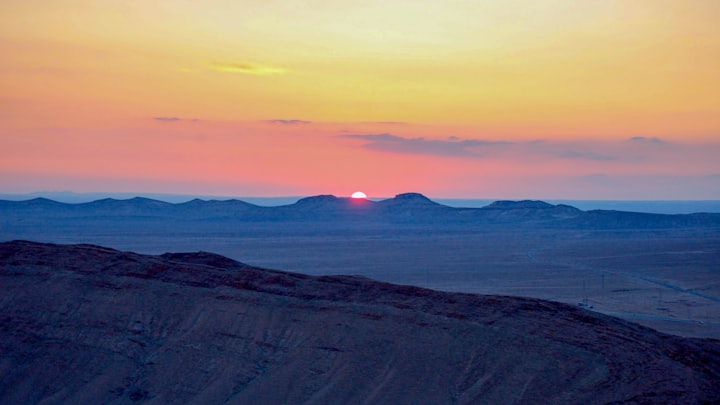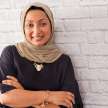
Slowly, as if his shaking, wrinkled hand would cause a clamor, my grandfather, Adil, pressed his index finger to his lips to indicate I stay quiet. I nodded just as carefully to show that I understood the seriousness of our situation. We were hiding in a narrow closet, the door masked by faded Syrian draperies hanging from the ceiling. I could hear the men, two of them, I think. They were looking for us. My grandfather’s shop was dark, except for the flashlights used to scour the store and our small upstairs apartment.
“Yalla, yalla,” one of them urged.
“I don’t understand. Where are they…” his partner wondered aloud.
“Let’s go. Rebels will see us,” the other one hissed in reply.
“Faizal will be angry if we don’t bring them in.”
“Better him angry than us dead. Let’s go!”
The men left the shop, but we didn’t move. Grandfather shifted down onto the floor of the tight closet, his knees bent. He then reached up to help me sit as well. My heart drummed loudly—terrified. I knew I wouldn’t sleep tonight. Adrenaline roared through my veins, but I didn’t want to be alert. I wanted quiet. I ached for stillness and peace, and part of me wished my body would give way so I would no longer have to fight to live. This is what was racing through my mind as I stared through the darkness, eyes on the door.
***
There wasn’t much to eat in the morning: dry bread, spiced yogurt, and some dates. No matter, I wasn’t hungry. Grandfather nudged a saucer from across the table. “Your tea is getting cold. The bread will taste better with it hot.”
“They said, Faizal, last night. Is that the same man?”
My grandfather looked small as he struggled with his reply, ironic for a man six feet tall. He has been caring for me, alone, for the last four years since we lost our family. Our home collapsed under the force of rocket blasts. My mother and father, my older sister and brother, although gone from this world, are spared from the horror of living through a never-ending civil war. The entire neighborhood fell that day, leaving a few dozen people stranded in Hurriya in the city of Idlib. I was with my grandfather at his shop five miles away. He sold shoes most of his life, and we were searching through the inventory to find a pair for my father.
There was an unspoken agreement between grandfather and me. Despite the destruction around us, we never speak about death. Instead, death lingers at our heels, like a pet begging for attention and waiting until we utter its name upon our lips. But we couldn’t avoid calling out to it forever because if the men looking to capture us belonged to Faizal, then our death would soon follow.
“Yes,” grandfather responded with a heavy sigh. “I think it is the same Faizal and his faction.” My heart began the heavy rhythmic beating it has warily become accustomed to. Once more, adrenaline, soured by fear, coursed through my blood like poison. “Whyyyyy?” I wailed. “We don’t know anyone; we haven’t done anything—we’re insignificant!” I began gasping for breath. Grandfather came over and knelt by my side. “Breathe, Sama, please,” he said. “Take deep breaths. We will hide, we will be okay, InshAllah.” But my sobs were suffocating—a never-ending cycle of breath and tears. I take back what I said last night about wanting my body to give up. Even though I have no family, home, or a future to dream of, I don’t want to die. Oh God, please! Don’t let us die.
***
In a war zone, news travels in whispers. Grandfather’s shoe store remained open every day. There was nothing else to do. At first, there was some income, but as the war raged into years four, five, and six, earnings were replaced with charity. Some asked for water and bandages—others, a place to rest after their home fell. A few, mostly children, asked for directions. Small, crying toddlers—the lucky ones with older siblings—all roaming the streets confused and alone. Grandfather would give them all shoes, even if they didn’t ask for them.
Whoever we helped brought whispers of destroyed buildings and missing neighbors. Some whispered news of Faizal. Once part of the government’s army, Faizal and his regiment broke away from leadership and now terrorize locals independently. Across multiple cities, people have gone missing at his hands. No one knows what happens to them. But Faizal’s victims are targeted, likely trafficked into slavery while the healthy ones have their organs sold on the black market. It’s rumored that he keeps their names in a little black book.
Perhaps, somewhere, a lovely girl, 12 years old like me, has a failing heart. And since such donations are rare, her wealthy and magnanimous parents are willing to pay for one, no matter the cost. Would my love travel with my heart into her spirit? Would she wake from her surgery and feel the weight of hugs and kisses on her chest from an honorable Syrian family? Was my purpose to live long enough to pass along my family’s warmth to someone else? Am I not worthy of it?
***
I never thought about how much my hands sweat. Tonight, however, with the blindfold over my eyes and the tape covering my mouth, I was acutely aware of my hot slippery hands trying to hold on to my grandfather. We leaned on each other in the back of a van; the sudden bumps and turns in the road shocking our surrendering bodies alert. There were others in the vehicle with us, most silent, a few whimpering. Our kidnappers were merciful; they allowed me and my grandfather to sit by each other. So, we grasped hands, grandfather’s tightly bound wrists fighting to encase my palms. I was embarrassed at how wet they were.
It was a long ride. When the van finally stopped, and the doors opened, we felt a rush of cool air, an eerie sensation of relief. The men around us shuffled quickly, pulling us out of the vehicle. We were left standing together, in a building, I think.
“Hassan!” a deep voice suddenly called out. The people to my left began wailing as they were ushered away. I heard a heavy metal door close. Grandfather, still holding my hands, was shaking.
“Ibrahim.” Another two or three people were taken from our group. The cries of sorrow and despair from the shrinking crowd were growing louder.
She’s lucky, I thought. The girl who will take my heart couldn’t ask for a better one. Mine was strong and brave, full of wonder and curiosity, forgiveness, and joy. Hot tears dampened my blindfold. My heart has seen me through a short and difficult life, but it never lost sight of kindness. My only wish is that the girl will teach my heart the meaning of hope. I couldn’t do that here in this life.
“Ashraf!”
A surprisingly gentle hand touched my shoulder and guided me forward. We walked awkwardly as my grandfather and I continued to hold on to each other. After a few yards, we heard a door close behind us. My blindfold was removed, but my eyes didn’t open right away. Someone untied my hands and carefully peeled the tape from my mouth. When the blurriness cleared and my vision returned, I searched for grandfather. He stood a foot away on my left. In the dim light, his silhouette towered over everyone in the room. He stood tall with his shoulder’s back. He didn’t look at me, only straight ahead at the man walking towards us scribbling in a little black book.
I am brave like my grandfather, honorable like my parents, and strong like my sister and brother. So, I turned to our kidnapper. He came up close to my grandfather. “Assalam-o-alaikum. You are, Adil Ashraf?”
My grandfather nodded. The man scratched something out of his book. He then turned and stood in front of me. “And you, little one? Sama Ashraf?” I looked up to meet his gaze, but his eyes remained on his book. “Yes,” I dared to say. He scratched in the book again. Then, he knelt to meet my face and smiled. I was taken aback by how young he looked. He could have passed for one of my brother’s friends. Maybe they would have gone to university together.
“I’m sorry to have frightened you. But my men and I work at night. We need to be quick and quiet, so there is no time to explain.”
I remained silent.
“I am Faizal. Tonight, you and your grandfather will be joining others on a long journey. You are going to Turkey.”
So, the little girl was Turkish. At least my heart wouldn’t be too far from home.
“Turkey?” Grandfather quietly spoke up.
Faizal nodded. “Arrangements have been made for you to cross the border. It isn’t an easy journey and whether you survive the trip is up to Allah. But if you reach Turkey, you can request asylum.” He turned to one of his men, who handed him an envelope. “Here,” he said, giving it to grandfather. “Some money. Use it to apply for a work visa.”
I felt I was listening to the conversation from afar, no longer present in the room. Thankfully, grandfather spoke up. “I don’t understand. What are we doing here?”
Faizal’s voice was calm and rehearsed. “My men and I are paid to transport people out of Syria.”
“But…” grandfather stammered, “Whe..where did this money come from?”
“I don’t know where the money comes from, and I don’t ask. Family, maybe? Friends?”
“We only have each other,” grandfather responded in shock.
“Then Allah has blessed you with freedom,” Faizal declared. He ushered his men to keep things moving. “You have to leave now. Some food and supplies are in the other room. Relieve yourself and wash up. You depart in an hour.” He indicated for someone to call in the next family.
“Wait, please,” grandfather pleaded as he and I were being led out. He shrugged the men’s hands off of him and walked closer to Faizal. “Please help me understand. Why would someone help us?”
Faizal sighed. He no longer appeared as young as I first thought. “I don’t know.” He hesitated. “Sometimes money comes from families trying to rescue loved ones. Maybe from sympathizers living in other cities or foreigners who oppose the war.” He continued, “Yours are the names in my book. Someone paid 20,000 American dollars to remove both of you from Idlib. A third of it is mine, another third pays to move you, and the rest is yours. Now, please, keep moving.”
“Ya Allah!” grandfather cried and moved to embrace Faizal, who quickly shook the affection away. “Keep moving. When you leave here, you will be temporarily blindfolded so that you are unable to give away our location in case you’re intercepted. Trust the guides.”
Grandfather held me tightly as we followed the men out of the room, but I called out to Faizal. “Uncle! The stories say you are a bad man. Why?” Faizal turned to me once again and took a moment to respond. “It’s hard to turn away those who need help. But if every mother, father, and child sought me out with no money…then, it would be my hands that are tied.”
I struggled to respond. I wanted to thank him but was overwhelmed by the enormity of what was happening. Instead, I stood frozen. Faizal smiled. It was the smile that made him look young.
“What’s the matter, little one? Aren’t you worthy of living? No point in questioning the blessing. Accept it and fill your heart with hope. Maybe one day you can return and rebuild your home.”






Comments
There are no comments for this story
Be the first to respond and start the conversation.